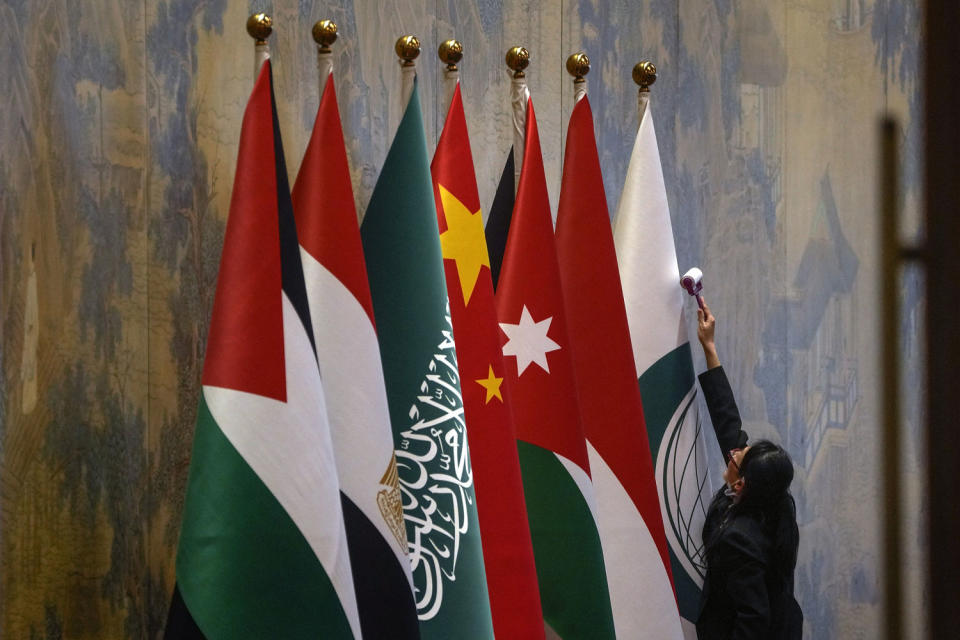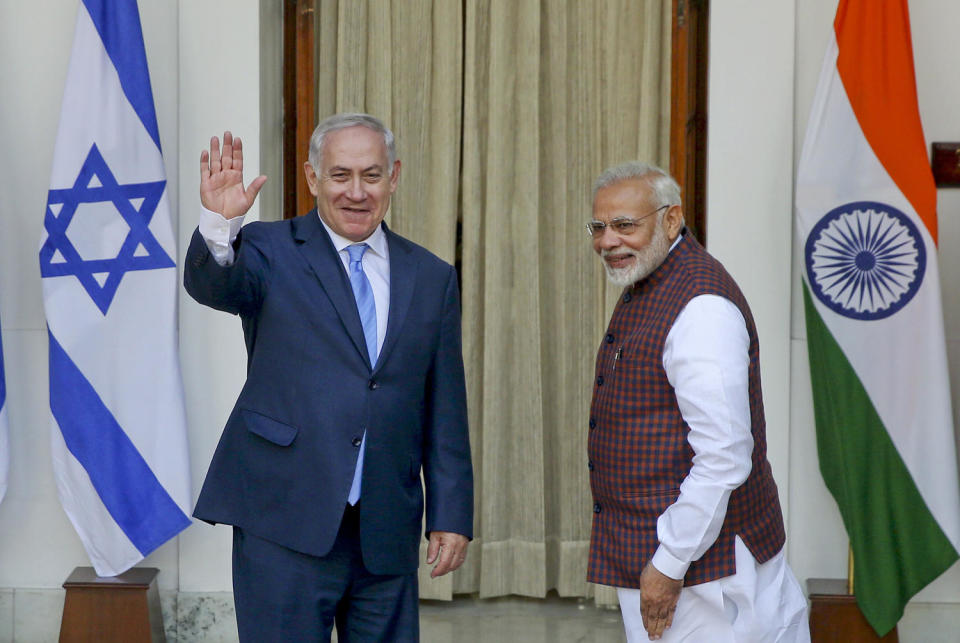In Israel-Hamas war, China and India walk opposite sides of a fine line
- Oops!Something went wrong.Please try again later.
HONG KONG — As India and China seek greater influence on the global stage, the Israel-Hamas war is testing their diplomatic prowess.
The world’s two most populous countries have both strived to appear neutral in the conflict, mindful of the need to balance their relations with Israel and the Palestinians.
They also have broader concerns: China, feeling targeted by the U.S. and its allies, has been strengthening its ties with countries outside the West and asserting its diplomatic presence, particularly in the Middle East where it seeks stability to protect its investments.
India, meanwhile, is trying to cast itself as the leader of a united Global South that would rather not choose between the U.S. and China.
Both countries have had formal diplomatic relations with Israel since 1992, and both recognized Palestine as a state upon its declaration in 1988. They also both stress the importance of a two-state solution.
But they have diverged in their response to the current conflict, with China leaning toward the Palestinians and India leaning toward Israel in what is somewhat of a shift for both countries.
Those leanings are reflected in the way their populations discuss the conflict online, where misinformation and racist remarks are inflaming tensions as they have the world over.
China: ‘Brotherhood’ with the Arab world
Beijing was the first stop Monday for a group of Arab and Muslim foreign ministers who are visiting all five permanent members of the United Nations Security Council as they seek to end the hostilities. The delegation representing Saudi Arabia, Egypt, Jordan, Indonesia, the Palestinian Authority and the Organization of Islamic Cooperation, which includes 57 Muslim member countries, called for an immediate cease-fire.
Chinese Foreign Minister Wang Yi said Beijing “holds good friendship and brotherhood with Arab and Islamic countries,” and that it has “always firmly supported the just cause of the Palestinian people to restore their legitimate national rights and interests,” according to an official readout.

While condemning acts that harm civilians, China has refrained from explicitly condemning Hamas over its Oct. 7 terrorist attack on Israel and on Monday described Israel’s retaliatory strikes in the Gaza Strip as “collective punishment.” Israeli officials have expressed “deep disappointment” with China’s position.
Though China has had good relations with Israel, its historical experiences may make it less likely to identify with it, said Bill Figueroa, an assistant professor at the University of Groningen in the Netherlands who studies China in the Middle East.
“They do look at the situation from the same perspective as many people in the region do, and their sympathies just genuinely lie with the Palestinians,” he said.
That public sympathy has at times taken an ugly turn on Chinese social media, where antisemitic comments have multiplied since the start of the conflict, although researchers note there have been Islamophobic posts as well.
When a video circulated online of a Chinese Israeli woman, Noa Argamani, being abducted from a music festival by Hamas militants, commenters questioned why the Chinese government should do anything to help her. The German Embassy in China, meanwhile, threatened to block some users from its social media account after receiving comments glorifying Nazism.
Chinese state media have similarly emphasized civilian suffering during the Israeli military response in Gaza and repeated racist tropes about Jewish influence in the U.S. In the early days of the conflict, Chinese state broadcaster CCTV shared a clip from a 2020 program in which Jews are said to make up 3% of the U.S. population but “control more than 70% of its wealth.”
The antisemitic rhetoric is all the more jarring because of the historically friendly relationship between Chinese and Jewish people, thousands of whom took refuge in China during World War II.
But the conversation is not homogeneous, said Wendy Zhou, a doctoral researcher at Georgia State University who studies the Chinese internet.
“Some perspectives are emerging that express support for the civilians and denounce the violence initiated by groups like Hamas, while also highlighting the significance of Palestinian self-determination,” she said in an email.
Other comments reflect pride in China’s peacemaking aspirations and draw comparisons between the Palestinians’ struggles and China’s past experiences with colonialism.
“It appears that the core issue isn’t a genuine animosity towards Jewish people but rather a projection of anti-imperialist and anti-American feelings onto the Israeli government, often conflating Israel with Zionism,” Zhou said.
Though China’s online censors generally pay little attention to racist posts that are not politically sensitive, they appear to have started reining in antisemitic and other objectionable content after the international media attention, Figueroa said.
“It’s hurting their efforts to seem neutral, which is what they’re trying to cultivate,” he said.
Figueroa said the Chinese government’s criticism of Israel had been relatively mild but seemed harsh compared with the initial stance of the U.S. and other Western countries, which emphasized Israel’s right to defend itself and resisted calls for a cease-fire.
“Ultimately, it’s only pro-Palestinian from that perspective,” he said, noting that Western criticism of Israel has intensified as civilian casualties in Gaza have mounted, shifting closer to the Chinese position.
India: Growing closer to Israel
In the first few days of the war, India was quick to express support for Israel but said little about Palestinians.
“We stand in solidarity with Israel at this difficult hour,” Prime Minister Narendra Modi said on X soon after the Hamas attack.
Though India has a long history of supporting Palestinian rights, its relations with Israel have become stronger under Modi and his Hindu nationalist government. In 2017, he became the first Indian prime minister to visit Israel, and his relationship with Israeli Prime Minister Benjamin Netanyahu has often been described as a “bromance.”

The Israeli model fits well with Modi’s vision for India, said Ashok Swain, a professor of peace and conflict research at Uppsala University in Sweden.
“There is an ideological match between Zionists in Israel and Hindu nationalists in India,” he said, citing their common emphasis on a strong, religion-based state and view of Islam as a threat.
The two countries have closely collaborated on antiterrorism efforts, and India is Israel’s top arms buyer. Their cooperation ramped up especially after 2008, when a series of terrorist attacks in Mumbai coordinated by militants based in neighboring Pakistan killed 175 people, including an Israeli American rabbi and his wife who were killed in a siege on a Jewish center.
India’s online discussion of the Israel-Hamas war has been marked by Islamophobia and misinformation, often pushed by pro-government accounts. Expressions of support for Israel often include slogans associated with Hindu nationalism, said Sayeed Al-Zaman, an assistant professor in the department of journalism at Jahangirnagar University in Bangladesh.
“While some intentionally disseminate such misinformation, many unknowingly believe it,” he said in an email.
The misinformation may be traveling far beyond India’s borders. The Digital Forensic Research Lab, part of the Atlantic Council, said last month that it had identified at least 25 accounts on X, many of which claimed to be based in India, that were engaged in a coordinated campaign to spread false and inflammatory information. Much of it appeared to be pro-Israel, including unverified reports that babies had been beheaded in the Hamas attack.
Swain said the Indian government was “playing a two-level game” in which Modi and other political leaders take a strong pro-Israeli stance, while the Foreign Ministry tries to strike more of a balance. Siding with Israel plays well with Modi’s Hindu nationalist base, he said, but Indian diplomats are thinking more long-term and are concerned about maintaining good relations with the Middle East.
There is strong support for Palestinians among India’s 200 million Muslims, Swain said, as well as left-of-center parties that see India’s colonial history reflected in the Palestinian experience.
On Sunday, a protester wearing a T-shirt that said “Stop Bombing Palestine” briefly stopped play at the Cricket World Cup final when he ran onto the pitch at a 130,000-seat stadium in Ahmedabad, India.
Opposition parties were outraged by India’s abstention last month on a U.N. General Assembly resolution calling for an immediate humanitarian truce, saying it reflected New Delhi’s subordination to the U.S. and its ally Israel. India said it abstained on the resolution, which passed with overwhelming support but was opposed by the U.S. and Israel, because it failed to explicitly condemn Hamas.
Abstaining in the face of Gazan civilian deaths “goes against everything our country has stood for throughout its life as a nation,” Priyanka Gandhi Vadra, general secretary of the opposition Congress party, said on X.
This article was originally published on NBCNews.com

